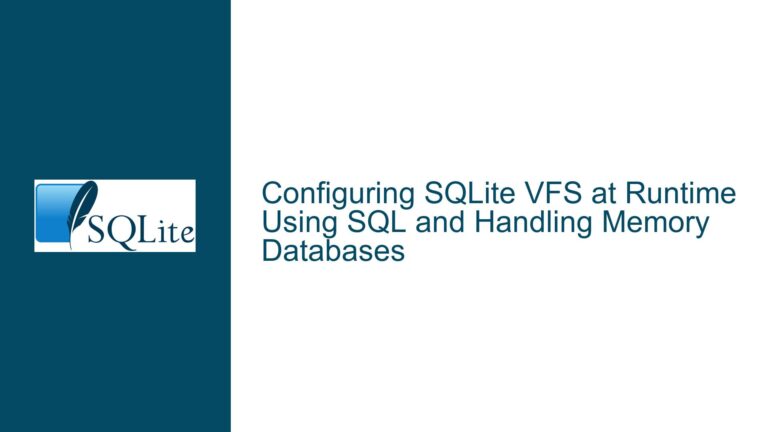Enhancing SQLite with URL Parsing Functions for Web Applications
Issue Overview: The Need for Built-In URL Parsing Functions in SQLite
SQLite is a lightweight, serverless database engine widely used in web applications due to its portability, ease of use, and efficiency. However, one limitation that often arises in web development scenarios is the lack of built-in functions for parsing URLs and their query parameters. This functionality is crucial for applications that rely on REST-based APIs or need to process URLs stored in the database.
The core issue revolves around the absence of native SQLite functions akin to PHP’s parse_url and parse_str. These functions are essential for breaking down URLs into their constituent parts (e.g., scheme, host, path, query parameters) and parsing query strings into key-value pairs. While SQLite provides robust string and JSON manipulation capabilities, developers often resort to workarounds or external scripting to achieve URL parsing, which can lead to inefficiencies and inconsistencies.
The discussion highlights a specific use case where a developer attempts to parse a URL and its query parameters using SQLite’s existing functions. The example demonstrates a combination of string manipulation and JSON functions to extract the path and query parameters from a URL. However, this approach is cumbersome and lacks the elegance and efficiency of built-in functions.
The developer’s request for native URL parsing functions is driven by the desire to streamline web application development. By enabling URL parsing directly within SQLite, developers could simplify data modeling, reduce redundant code, and improve interoperability across different programming languages and frameworks.
Possible Causes: Why SQLite Lacks Native URL Parsing Functions
The absence of built-in URL parsing functions in SQLite can be attributed to several factors, each rooted in the database’s design philosophy and use cases.
1. SQLite’s Minimalist Design Philosophy
SQLite is designed to be a lightweight, self-contained database engine with a minimal footprint. Its core library intentionally avoids including features that are not universally applicable or that can be implemented efficiently outside the database. URL parsing, while useful for web applications, is considered a specialized feature that falls outside the scope of SQLite’s general-purpose design.
2. Availability of External Solutions
URL parsing is a common requirement in web development, and most programming languages used in conjunction with SQLite (e.g., PHP, Python, JavaScript) already provide robust libraries for this purpose. For example, Python’s urllib.parse and PHP’s parse_url are widely used and well-documented. SQLite’s extension API allows developers to integrate these external libraries as user-defined functions, reducing the need for native implementations.
3. Performance Considerations
Parsing URLs and query strings involves complex string manipulation and regular expressions, which can be computationally expensive. Embedding such functionality directly into SQLite could introduce performance overhead, especially for large datasets or high-throughput applications. By delegating URL parsing to the application layer, SQLite maintains its performance and scalability advantages.
4. Focus on Core Database Functionality
SQLite prioritizes core database features such as ACID compliance, transaction management, and efficient storage. While it supports extensions and user-defined functions, the development team is cautious about adding features that could bloat the core library or complicate maintenance.
5. Lack of Standardization in URL Formats
URLs can vary significantly in structure and format, depending on the application and context. For example, some URLs may include fragments, authentication credentials, or non-standard query parameters. Implementing a universal URL parsing function that handles all edge cases would require significant effort and could lead to inconsistencies.
Troubleshooting Steps, Solutions & Fixes: Implementing URL Parsing in SQLite
While SQLite does not natively support URL parsing, developers can achieve this functionality through a combination of built-in functions, extensions, and external libraries. Below, we explore several approaches to address this limitation.
1. Using SQLite’s Built-In String and JSON Functions
SQLite provides a rich set of string and JSON functions that can be leveraged to parse URLs and query parameters. The following example demonstrates how to extract the path and query parameters from a URL:
WITH
_testdata("url", "method") AS (
VALUES('entity1/123/entity2/456?p=0&arg1=something&arg2=true', 'GET')
),
parse(method, url, path, params) AS (
SELECT
"method",
"url",
JSON('["' || REPLACE(SUBSTR("url", 1, INSTR("url", '?') - 1), '/', '","') || '"]'),
SUBSTR("url", INSTR("url", '?') + 1)
FROM _testdata
)
SELECT *
FROM parse;
This query splits the URL into its path and query components, with the path converted into a JSON array. While this approach works for simple cases, it becomes unwieldy for more complex URLs or when additional components (e.g., scheme, host) need to be extracted.
2. Creating User-Defined Functions (UDFs)
SQLite’s extension API allows developers to define custom functions in their preferred programming language. The following Python example demonstrates how to create a UDF for parsing URLs:
from sqlite3 import connect, Row
from urllib.parse import urlparse
from json import dumps
def init_db(con):
con.execute("CREATE TABLE podcast(podcast_url)")
con.execute("INSERT INTO podcast VALUES('https://podcasts.files.bbci.co.uk/b05qqhqp.rss')")
con.row_factory = Row
con.create_function("urlparse", 1, urlparse_as_json_str)
def urlparse_as_json_str(arg):
return dumps(urlparse(arg)._asdict())
if __name__ == '__main__':
db_name = ':memory:'
qry = "SELECT podcast_url, json_extract(urlparse(podcast_url), '$.netloc') AS netloc FROM podcast"
with connect(db_name) as con:
init_db(con)
for row in con.execute(qry):
print(f"{row['podcast_url']} : netloc - {row['netloc']}")
This script defines a urlparse function that parses a URL and returns its components as a JSON string. The json_extract function is then used to retrieve specific components (e.g., netloc) from the parsed result.
3. Leveraging SQLite Extensions
Developers can create or use existing SQLite extensions to add URL parsing capabilities. For example, the sqlite-url extension provides functions for parsing and manipulating URLs directly within SQLite. While this approach requires additional setup, it offers a more integrated solution compared to UDFs.
4. Preprocessing URLs in the Application Layer
In many cases, it is more efficient to parse URLs before storing them in the database. This approach simplifies database queries and ensures consistent data formatting. For example, a web application could use PHP’s parse_url function to extract URL components and store them in separate columns:
$url = 'https://example.com/path?arg1=value1&arg2=value2';
$parsed_url = parse_url($url);
$scheme = $parsed_url['scheme'];
$host = $parsed_url['host'];
$path = $parsed_url['path'];
$query = $parsed_url['query'];
// Store parsed components in the database
$stmt = $pdo->prepare("INSERT INTO urls (scheme, host, path, query) VALUES (?, ?, ?, ?)");
$stmt->execute([$scheme, $host, $path, $query]);
5. Using JSON as an Intermediate Format
If URL components need to be stored and queried dynamically, JSON can serve as an intermediate format. The following example demonstrates how to store and query parsed URL components in a JSON column:
CREATE TABLE urls (
id INTEGER PRIMARY KEY,
url TEXT,
components JSON
);
-- Insert parsed URL components as JSON
INSERT INTO urls (url, components)
VALUES (
'https://example.com/path?arg1=value1&arg2=value2',
json_object(
'scheme', 'https',
'host', 'example.com',
'path', '/path',
'query', 'arg1=value1&arg2=value2'
)
);
-- Query specific components
SELECT json_extract(components, '$.host') AS host
FROM urls;
This approach provides flexibility and simplifies querying, as JSON functions can be used to extract specific components.
6. Evaluating the Need for Native Functions
While the above solutions address the immediate need for URL parsing, developers should consider whether native functions would significantly improve their workflow. If URL parsing is a frequent requirement, advocating for the inclusion of such functions in future SQLite releases may be worthwhile. However, given SQLite’s design philosophy, this is unlikely to happen without strong community support.
In conclusion, while SQLite lacks native URL parsing functions, developers have several options for implementing this functionality. By leveraging SQLite’s string and JSON functions, creating user-defined functions, or preprocessing URLs in the application layer, developers can effectively parse and manipulate URLs within their applications. Each approach has its trade-offs, and the choice depends on the specific requirements and constraints of the project.






